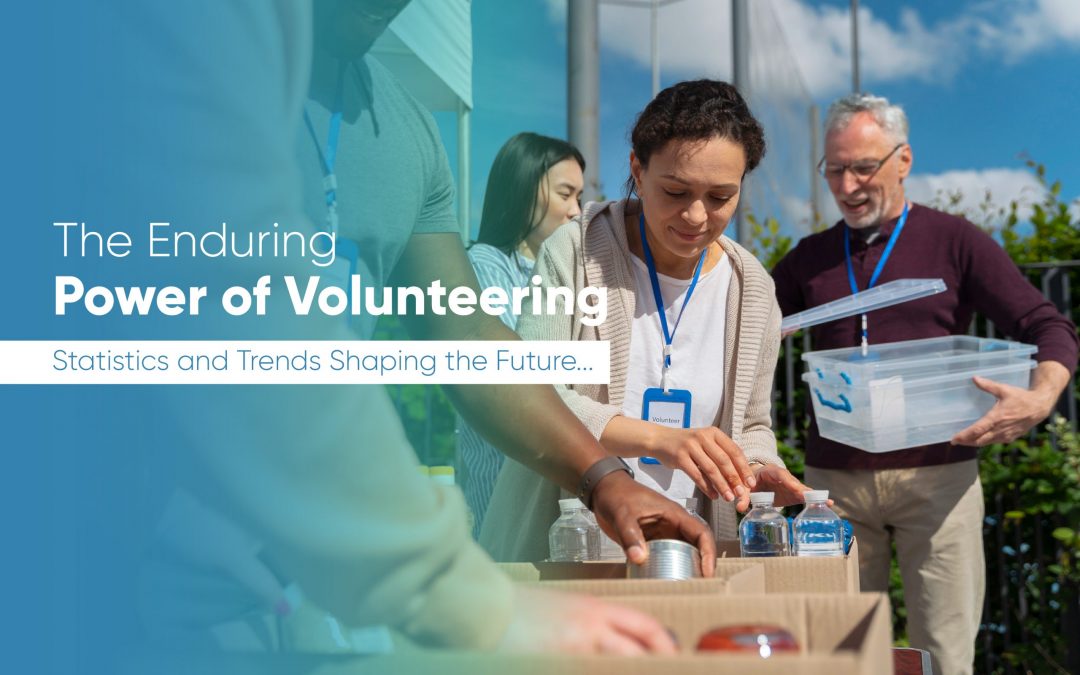Volunteering has long served as the backbone of civil society. From thrift shops staffed by local church members to food banks feeding thousands, engaged communities rely on the tireless efforts of volunteers. Their gifts of time, talent, and passion breathe life into visionary organizations that tackle society’s greatest challenges.
Despite hectic modern lifestyles, data reveals volunteering’s enduring appeal. Technological evolutions have ushered in new flexible formats while corporations increasingly promote giving back. As volunteering rises globally, nonprofits must harness cutting-edge strategies and next-gen tools to empower these special supporters. Organizations can unlock maximum impact by understanding the core motivations behind volunteering coupled with emerging formats and future forecasting.
Why People Give Back
The desire to volunteer spans ages, backgrounds, and personalities. Whether influenced by values, religious beliefs, or personal experiences, those who raise their hand to give back share common motivations. Understanding these core drivers enables nonprofits to inspire more giving.
Altruism and a Desire to Help Others
At volunteering’s core lies basic human altruism – the wish to increase another’s welfare without reward. Volunteers derive intrinsic satisfaction from simply knowing they improved lives. Tapping into this spirit of selfless service provides the most renewable resource. Marketing how every minute makes a real difference inspires continual giving.
Personal Growth and Development
Many volunteers wish to gain new experiences, apply specialized skills, or address personal passions through serving. Volunteering offers opportunities for new relationships, building talents, and gaining perspective, which opens doors to new possibilities. Enabling volunteers to pursue specific interests enhances satisfaction and retention. Identifying underlying personal goals empowers fulfillment.
Social Connection and Belonging
A sense of community and belonging ranks among the top reasons people serve. Bonding over shared interests or being part of something bigger than oneself offers special camaraderie. Peer recognition and social networks motivate many. Creating fun, engaging service opportunities helps attract volunteers seeking new friendships while still doing good.
Civic Engagement and Social Responsibility
Some volunteers step up simply wishing to be engaged, active citizens bettering communities. Recent tumultuous times amplified desires to make positive societal contributions. Providing meaningful opportunities to shape neighborhoods, support marginalized groups, or tackle issues aligns with these civic interests. Facilitating active change-making creates great momentum.
Increased confidence, wellness benefits, and career development also bolster volunteering’s appeal. By leveraging these multifaceted motivations, nonprofits can exponentially strengthen the community connections volunteering offers while empowering donors to become stakeholders actively shaping missions.
The Impact on Nonprofits: The Lifeblood of Many Organizations
According to nonprofits volunteer statistics, volunteering has always served as an invaluable resource, but recent challenges magnified this reliance. As needs accelerated amidst growing costs and workforce strains, volunteers became essential to augment overstretched staff. Their flexibility in filling urgent gaps expanded critical services. Tracking volunteering’s exponential impact compels smart investments in recruitment, retention, and recognition to unleash this unlimited potential.
Increased Capacity and Reach
With volunteer support, organizations efficiently launch new campaigns, programs, and initiatives that were previously impossible due to constrained budgets or limited personnel. Local teachers alone could never meet every struggling student, but skilled tutors exponentially increase educational access and outcomes. Thanks to the expanded effort, volunteers become force multipliers, allowing more people to be reached.
Enhanced Expertise and Skills
Today’s highly specialized volunteers include legal advisors and construction project managers. These unique competencies amplify capabilities that understaffed charities could never afford in paid positions. Expert skills also introduce innovation. New perspectives spark process improvements and inventive solutions.
Cost Effectiveness
Volunteerism significantly controls overhead enabling nonprofits to reserve more funding for vital programming. Eliminating the need for paid staff in key roles directly fuels service delivery. Additionally, many volunteers leverage personal resources in the form of creativity, supplies, and professional connections to eliminate costs. Smart coordination maximizes this beneficial outsourcing.
Improved Service Delivery
With deep emotional connections to missions, volunteers often infuse roles with incredible passion, making every interaction heartfelt. Clients sense this authenticity and empathy. Combined with flexible schedules, volunteers can provide individualized attention, improving outcomes and client satisfaction. This people-powered multiplication proves good both financially and morally for all involved.
Investing in volunteer infrastructure seems counterintuitive to cash-strapped organizations, but data shows that a little support yields exponential returns on human capital.
Emerging Trends: Shaping the Future of Volunteering
Tomorrow’s volunteering landscape promises exciting innovations but also new complexities requiring planning to realize the limitless opportunities while mitigating risks these evolutions incur.
The Rise of Virtual Volunteering
Remote service grew steadily in recent years as advanced technologies enabled new formats, but COVID-19 restrictions made virtual volunteering explode, becoming the norm seemingly overnight. By 2023, 80% of volunteers served at least partially online. Allowing secure access to tools and data empowers meaningful remote roles. Confidential helplines, tele-mentoring programs, and micro-tasking platforms will dominate, prioritizing inclusion, digital literacy, and data security.
Focus on Micro-Volunteering
Facing increasing time constraints, modern volunteers seek flexible quick-win opportunities like structured remote projects, which allow bite-sized commitments versus prolonged on-site obligations. Offering diverse micro-volunteering formats – short-term teams supporting special events or episodic skills-based projects – opens doors to untapped talent. Repeated exposure to approachable options builds lifetime loyalty.
Skill-based Volunteering
Matching professional expertise to mission needs has seen 63% growth since 2016. Today, over 50% of Fortune 500 companies manage skill-based programs. Allowing short-term consultants to donate specialized services like financial planning or creative solutions synthesizes business infrastructure with grassroots causes, yielding shared value. Expanding cross-sector partnerships multiplies community change.
Corporate Volunteering
Over 70% of millennials consider workplace volunteering important. Employers embracing volunteering as talent development and retention saw double the applicant interest. Offering team service events, pro bono consulting initiatives, or nonprofit board placements attracts conscious talent. Syncing with companies around shared priorities builds capacity while empowering employees.
The Growing Role of Data
Sophisticated technologies equip nonprofits to capture detailed volunteer data – interests, availability, skills, etc. Analyzing this intelligence enables personalized engagements, improving fulfillment by aligning talent with relevant opportunities.
Automated dashboards track individual and program progress in real-time, allowing streamlined oversight. Data empowers optimization but also risks. Strict data governance is essential.
While formats shift and technologies disrupt, passion and compassion remain volunteering’s source codes. Nonprofits must balance innovation with inclusivity ensuring advancement never compromises core humanitarian roots by maximizing both heart and smarts in equal measure.
Conclusion
Despite increasingly busy modern lifestyles, the enduring spirit of volunteerism continues gaining momentum thanks to flexible new formats, creative corporate partnerships, and passionate, socially-conscious talent. As skills-based and virtual volunteering explodes in popularity, nonprofits must harness digital tools and next-gen talent management strategies to empower these special supporters while combating new complexities technology brings. Organizations can unleash exponential impact that improves society while unleashing human potential by understanding the psychology motivating volunteers coupled with a mastery of emerging trends from micro-volunteering to integrated mobile tracking. Volunteerism has always served as the beating heart of empowering community action. Fueled by data and moved by meaningful innovation, the future burns bright.












